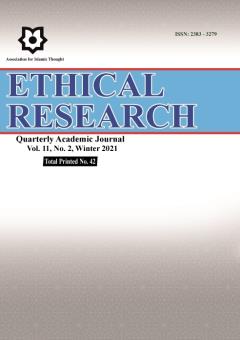قبای نظام حقوقی شایستهسالاری بر قامت کرامت انسانی به عنوان مفهومی اخلاقی
الموضوعات : Ethics and Islamic Education
سعید قبیدیان
1
,
علی اکبر گرجی ازندریانی
2
,
بیژن عباسی
3
![]()
1 - دانشگاه تهران
2 - دانشگاه شهید بهشتی
3 - دانشگاه تهران
الکلمات المفتاحية: اداره امور عمومی, اخلاق, شایسته¬, سالاری, کرامت انسانی, نظام حقوقی.,
ملخص المقالة :
یکی از موضوعات مهم در قلمرو حقوق، کرامت انسانی است. این موضوع از این جهت دارای اهمیت است که خود پایه بسیاری از حقوق، امتیازات و تکالیف انسانی شناخته می شود و امروزه کرامت انسانی نه تنها به عنوان یک حق غیرقابل سلب شناخته می شود، بلکه مبنای حقوق بشر است. از آنجایی که اداره امور عمومی با تکیه بر نظام حقوقی، نقش ها، حقوق و تکالیف را در یک جامعه مشخص می کند، و به نیازهای جامعه پاسخ می دهد، بر سرنوشت جامعه و کرامت انسانی تاثیرگذار است. شایسته سالاری به عنوان مفهومی شاخص در مدیریت، به دلیل اینکه به توانمندی انسان ها و تبدیل آن به توانایی توجه کرده و نقش ها، حق ها و تکالیفی برای بهره مندی از توانایی های انسان ها در اجتماع، پیش بینی می کند، نقش بسزایی در بهبود نظام حقوقی دارد. پرسش پژوهش پیش رو این است که آیا شایسته سالاری در نظام حقوقی منتهی به کرامت انسانی می گردد؟ به نظر می رسد که شایسته سالاری به دلیل تاثیری که در ایجاد نظام حقوقی کارآمد از طریق پاسخگویی به نیازهای انسان و ایجاد اداره مطلوب امور عمومی دارد، منتهی به بهبود اخلاق عمومی و کرامت انسانی می شود. پژوهش پیش روی، با روش توصیفی و تحلیلی و روش گردآوری کتابخانه ای ، بابررسی و نقداطلاعات، به توصیف و تفسیر آنچه که باید باشد، می پردازد.
Moein M. (2003). Moein Pocket dictionary. Tehran: zarrin publications.(In Persian)
Gladden EN.(1952). An Introduction to Public Administration. London: Staples publication.
Dehkhoda AK. (1994). Dictionary. 1st ed. Tehran: Tehran university publications. (In Persian)
Jaffari-Tabrizi MT. (1991).Global human rights from the perspective of Islam and the West.Tehran: Publications of the Office of International Law Services of the Islamic Republic of Iran.(In Persian)
Ataa-far A, Azarbayejani K. (2001). Investigating the amount of meritocracy in selecting public and private sector managers. Management knowledge. 14(54):15-38.(In Persian)
Saket MH. (1992). Jurisprudence, the knowledge of law. Mashhad: first publications. (In Persian)
Shonberg S. (2008). Legitimate expectations in administrative law. Translated by: Ranjbar A. Tehran: Mizan publication.
Kelsen H. (2008). Lean legal theory. Translated by: Nematollahi S. Tehran: Publication of Institute of Domain and University
Ebdali M. (2012).Legal approaches and extra-legal approaches. Tehran: Mizan publication.(In Persian)
Saljooghi M. (2011). Searches for the understanding of man and the civilization he has made in his society and the error he has made. Tehran: Mizan publication.(In Persian)
Pour-ezzat AA, Dehghani-kasvayi MS. (2015). Recognizing the identity of government management and knowledge management. Public Management Research.(30): 5-31. (In Persian)
Mckay S, Micheal M, Sean M and etc.(2015). Evidence-based policymaking and the public interest: lessons in legitimacy, Town Planning Review. 2(86).
Ansari MM. (2007). Political elitism. Tehran: Dadgostar publication.(In Persian)
Chase R.(1997).The knowledge based organization an international survey. Journal of knowledge management.
Sen A. (2000). Justice in Meritocratic Environments. Meritocracy and Economic Inequality. Editors: Kenneth Arrow, Samuel Bowles, Steven Durlauf, Princeton University Press.
Golkar B, Nasehifar V. (2002).Overview of meritocracy. Journal of Management Development .(8): 7-10. (In Persian)
Peters, Guy B. (2005).The Problem of Policy Problems, Journal of Comparative Policy Analysis. Research and Practice, 7(4).
Rajaei Z, Danesh-fard K, Faghihi A. (2017). Formation of policy in the field of administrative system health in Iran. Public Management Research. (38): 5-34. (In Persian)
Ehsani-konari G. (2009). Lights Of Life(Inspirational words from world celebrities).Tehran: Scientific Publications .(In Persian)
Vakil AS, Askari P. (2009). The constitution in the current legal order. 3st ed. Tehran: Majd publications.


